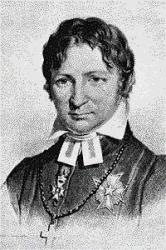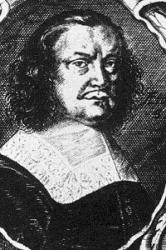Planning worship?
Check out our sister site, ZeteoSearch.org,
for 20+ additional resources related to your search.
- |
User Links
Person Results
Paulus Speratus

1484 - 1554 Person Name: Paul Speratus, 1484-1551 Author of "Salvation unto Us Has Come" in Evangelical Lutheran Worship Speratus, Paulus, D.D., was born in Swabia, Dec. 13, 1484. In a poem, written circa 1516, on Dr. J. Eck, he calls himself Elephangius, i.e. of Ellwangen; and in his correspondence, preserved at Königsberg, he often styles himself "a Rutilis" or "von Rötlen." These facts would seem to indicate that he was born at the castle of Röthlen, near Ellwangen. This property belonged to the Probst of the ecclesiastical corporation at Ellwangen, and Speratus's father was probably their bailiff or agent. The family name seems to have been Hoffer or Offer, and to have been in later years, following a practice common in the 16th cent., Latinized by himself into Speratus. He is probably the "Paul Offer de Ellwangen," who matri¬culated at the University of Freiburg (Baden) in l503. He is also said to have studied at Paris, and at some of the Italian universities.
In 1518 we find him settled as a preacher at Dinkelsbühl, in Bavaria. In the end of that year he was invited to become preacher in the cathedral at Würzburg. He went to Würzburg in Feb. 1519, but his preaching was much too evangelical for the new bishop, and he had to leave, apparently in the beginning of 1520. Proceeding to Salzburg he preached for sometime in the cathedral, until the archbishop there also would not tolerate his pronounced opinions. He left Salzburg in the autumn of 1520, and went to Vienna, where he appears to have graduated D.D. at the University. He was already married (probably as early as 1519), and was one of the first priests who had dared to take this step. After a violent sermon against marriage, delivered by a monk in St. Peter's church, at Vienna, the governor of Lower Austria (Count Leonhard von Zech) asked Speratus to make a reply. With the consent of the bishop he did so, and preached, on Jan. 12, 1522, a sermon in the cathedral (St. Stephen's), founded on the Epistle for the 1st Sunday after the Epiphany, in which he expressed his opinions very freely regarding the monastic life and enforced celibacy, and also clearly set forth the doctrine of Justification by Faith. This sermon (published at Königsberg in 1524) made a great impression, and was condemned by the Theological Faculty at Vienna, who also prevented Speratus from accepting an invitation to become preacher at Ofen, near Vienna.
On his way from Vienna to the north he stayed at Iglau in Moravia, where the abbot of the Dominican monastery appointed him as preacher. Here the people became greatly enamoured of him and of the Reformation doctrines,and stood firmly by him, notwithstanding the remonstrances and threats of the king, and of the bishop of Olmütz. In the summer of 1523 king Ludwig came to Olmütz and summoned Speratus to him. Without even the form of a trial he put him in prison, but after three months he released him, probably through the influence of his queen (Maria of Hungary), and of his cousin, the Margrave Albrecht of Brandenburg, but on the condition of his leaving Iglau and Moravia. In the end of 1523 Speratus came to Wittenberg, where he worked with Luther, and assisted him in the preparation of the first Lutheran hymn book (the Etlich cristlich lider. It contained 4 German hymns by Luther, 3 by Speratus, and 1 anonymous German hymn). Luther then recommended him to the Margrave Albrecht, and about May 1524 the Margrave appointed him as court preacher at Königsberg. Here he had also charge of the Altstadt church till Graumann came into residence, in Oct. 1525. He seems to have had the principal share in drawing up the Liturgy and Canons (Kirchenordnung or "Book of Church Order") for the Prussian church, which was presented to the Diet in December 1525, and printed in 1526. On March 31, 1526, he was chosen as the clerical commissioner to visit the parishes of Prussia and see that the new arrangements were carried out; and in the end of 1529 he was appointed Lutheran bishop of Pomesania, with his residence at Marienwerder. Here he remained until his death on Aug. 12, 1551.
Speratus was the author of various works, hut was best known as the Reformer of Prussia. Feeling that for the working of ordinary parishes it was necessary to have pastors who had been brought up in Prussia, and could preach, if need be, in Polish or Lettish, he gladly welcomed the foundation at Königsberg (1544) of the first Prussian university. Among other important events affecting his administration may be mentioned the Visitations of 1528, of 1538, and especially that which lasted from Dec. 15, 1542, to the middle of February 1543; the Synods of 1529 (the Synodical Constitutions were pub. in 1530), of 1530, and of 1531; the new Kirchenordnung of 1544; and the welcome he extended, in 1548, to the exiled Bohemian Brethren who settled iu Prussia.
As a hymn writer Speratus is principally known by the three hymns published in the Etlich cristlich lider, 1524. He also published (no place or date but Königsberg, 1527), in 1527, a version of Ps. xxvii., beginning, " Erzurn dich nicht, sei nicht neidisch;" and a Hymn of Thanksgiving, to be used after the sermon, beginning, "Gelobet sei Gott, unser Gott." These five are all that can be confidently ascribed to him. Of the five hymns mentioned above two have passed into English, viz.:—
i. Es ist das Heil uns kommen her. Law and Gospel. This, his most famous hymn, is founded on Rom. iii. 28. It was probably written in the autumn of 1523, either during his imprisonment at Olmütz, or else during his stay at Wittenberg. Included as one of the 8 hymns in the Etlich cristlich lider1524, dated 1523, and entitled, “A hymn of Law and Faith, powerfully furnished with God's Word. Doctor Paul Speratus."
Lauxmann, in Koch, viii. 236, calls it "the true confessional hymn of the Reformation, or, as Albert Knapp puts it, 'the poetical counterpart of Luther's preface to the Epistle to the Romans.'" He relates many instances of the effects it produced. It is a Scriptural ballad, setting forth, in what was, for the time, excellent verse, the characteristic teachings of the German Reformers; and is indeed of considerable historical importance. But for present day use it is too long, somewhat harsh in style, and too much a compend of doctrinal theology.
The only version we have found in English common use is:—
To us salvation now is come. In full by Dr. H. Mills, in his Horae Germanicae, 1845, p. 44. Other translations are:—
(1) "Now is our health come from above." By Bishop Coverdale, 1539 (Remains. (2) "Our whole Salvation doth depend." By J. C. Jacobi, 1725, p. 23. (3) "Now comes salvation from above." By Dr. G. Walker, 1860, p. 79. (4) "Salva¬tion hath come down to us." By Miss Winkworth, 1869, p. 123.
ii. In Gott gelaub ich, dass er hat aus nich.The Apostles' Creed. This is a free version, in 9 stanzas of 19 lines. First published in the Etlich cristlich lider, 1524. It was included in V. Babst's Gesang-Buch, 1545, and many others, but on account of its length and its unusual metre it has not found a place in recent hymnals. It is translated as "In God I trust, for so I must." By Bishop Coverdale, 1539. (Remain, 1846, p. 547.) [Rev. James Mearns, M.A.]
--Excerpts from John Julian, Dictionary of Hymnology (1907)
Paulus Speratus
Frans Michael Franzén

1772 - 1847 Person Name: Frans Michael Franzen, 1772-1847 Author of "The Little While I Linger Here" in Hymnal and Order of Service Franzén, Franz Michael, was born at Uleabôrg, Finland, in 1772, and educated at the University of Abo, where he became Librarian and Professor of Literary History. He was subsequently Minister at Kumla, Orebro, Sweden, and then of Santa Clara, in Stockholm. He was consecrated Bishop of Hernosand, in 1841, and died there in 1847. (See Supplement to Longfellow's Poets and Poetry of Europe.) Of his pieces one is in English common use. It begins "Jesum haf i ständigt minne," translated by Mrs. Charles in her Christian Life in Song, 1858, p. 250, as "Jesus in Thy memory keep" (Looking unto Jesus). Usually it begins with stanza ii., "Look to Jesus, till, reviving."
--John Julian, Dictionary of Hymnology, Appendix, Part II (1907)
Frans Michael Franzén
Marnie Barrell
b. 1952 Author of "Come to the celebration" in Alleluia Aotearoa Marnie Barrell is a hymn writer and piano teacher living in Christchurch, New Zealand and teaching at Christchurch School of Music.
Dianne Shapiro, from Christchurch School of Music website (http://www.csm.org.nz/about/staff/) and Barrell's Facebook page (accessed 10/30/2017
Marnie Barrell
David Schubert
b. 1942 Person Name: David Arthur Schubert, 19420 Alterer of "Robe yourself, my soul, in gladness" in Together in Song
David Schubert
John Ireland

1879 - 1962 Composer of "LOVE UNKNOWN" in The Presbyterian Hymnal John Ireland (1879-1962) studied at Durham University in England and became a church organist, choirmaster, editor, and lecturer, eventually teaching at the Royal College of Church Music. He was a gifted composer of music for voice, piano, organ, chamber music, and orchestra that were recognized for their excellence during his lifetime; LOVE UNKNOWN was his only hymn tune, found today in numerous hymnals.
Emily Brink
John Ireland
Andreas Hammerschmidt

1611 - 1675 Composer of "SAXONY (Meinen Jesum lass ich nicht)" in Evangelical Lutheran hymnal Andreas Hammerschmidt; b. about 1611, Bohemia; d. 1675, Zittau, Saxony
Evangelical Lutheran Hymnal, 1908
Andreas Hammerschmidt
Johann Balthasar König
1691 - 1758 Composer of "ELBE (O dass ich tausend Zungen hätte)" in Evangelical Lutheran hymnal Johann Balthasar König; b. 1691, Waltershausen, near Gotha; d. 1758, Frankfort
Evangelical Lutheran Hymnal, 1908
Johann Balthasar König
Howard Charles Adie Gaunt
1902 - 1983 Person Name: Henry Charles Adie Gaunt, 1902-1983 Author of "Dear Lord, to you again" in Complete Anglican Hymns Old and New
Howard Charles Adie Gaunt


 My Starred Hymns
My Starred Hymns


